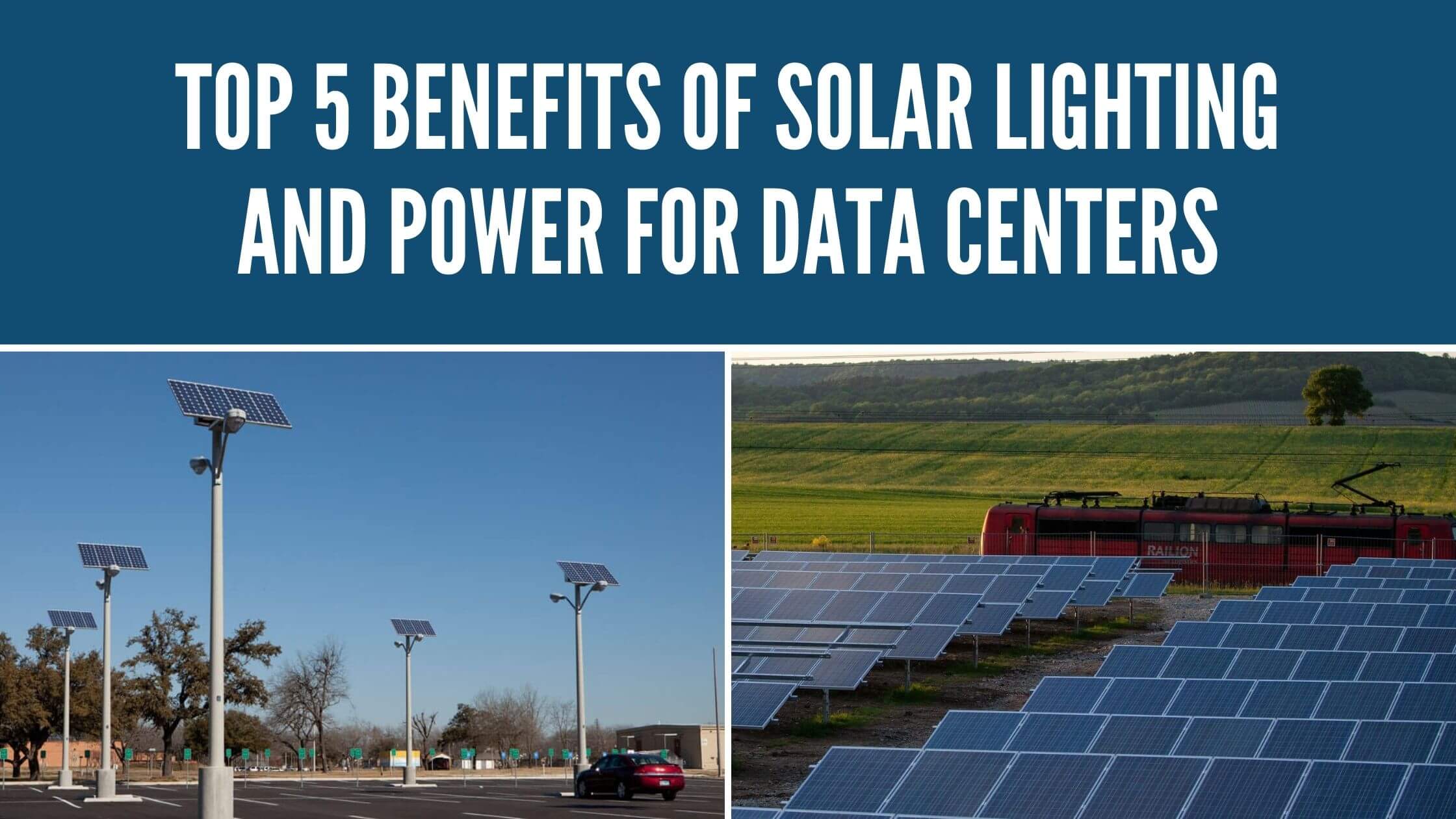Top 5 Benefits of Solar Lighting and Power for Data Centers

Contents
As the world increasingly relies on digital data, data centers have become critical infrastructure for businesses and organizations of all sizes. However, data centers consume massive amounts of energy, which can be costly and contribute to climate change. One way to reduce the environmental impact of data centers is through solar lighting and power systems.
Solar lighting can provide a data center a way to illuminate the site without trenching around to various areas. The lower operational costs for lighting can provide a way to increase safety and security without adding costs. It can also be a great way to provide additional lighting after the site has been developed.
Solar power systems can provide a data center with a way to offset operational costs and reduce environmental impacts. Solar can generate energy to feed the grid, offsetting the energy usage by the data center during the day, and even storing it in large battery backups for times when the energy grid is unstable. It can also use it to provide a lower environmental impact at the installation site.
Let’s look at the top 5 benefits of using solar lighting and power systems for data centers. In a nutshell, this includes:
- Cost savings through lower installation, operational and maintenance costs.
- Environmental sustainability provides a green alternative to dirty fossil fuels for lighting and power generation.
- A reliable energy source for areas prone to brownouts or blackouts.
- Increased energy security by providing an independent energy source and lowering the impact on the surrounding area.
- The ability to scale as the data center grows by adding additional off-grid solar lighting for illumination and solar power for energy production.
Cost Savings
One of the primary benefits of using solar lighting and power at data centers is cost savings. Data centers are typically very energy-intensive, which means they have high electricity bills. By using solar power, data centers can reduce their energy bills and potentially even earn money through the sale of excess energy back to the grid. Solar power is also a long-term investment, with the potential for a quick return on investment and decades of cost savings.
Similar Costs to Traditional Lighting:
Solar lighting systems are more expensive up front when traditional energy is already installed at the site, but almost always is less expensive than trenching through concrete or bringing power out to remote sites. However, over time, solar lighting systems will start to pay for themselves, providing a great ROI over their lifetime.
Lower Installation Costs:
Solar lighting also has about the same installation costs as traditional lighting without the need for high-powered transmission lines. Underground wiring is one of the largest cost factors for installing traditional lighting sources. Having all the wiring located at the pole, with every pole independent from the next, can have a much lower overall cost for installation.
Lower electricity bills:
Electricity is a significant cost for data centers, and solar energy can help reduce these costs. Using solar energy, data centers can generate their electricity, reducing their reliance on the grid and lowering their electricity bills.
Tax incentives and rebates:
The government offers tax incentives and rebates to businesses that use renewable energy sources like solar energy. By taking advantage of these incentives and rebates, data centers can significantly reduce the upfront costs of installing solar panels and further lower their electricity bills.
Lower maintenance costs:
Solar panels require minimal maintenance and can last up to 25 years or more. Using solar energy, data centers can significantly reduce their maintenance costs compared to traditional generators and electrical infrastructure that often require frequent and costly maintenance.
Overall, using solar energy can provide significant cost savings for data centers. By having similar costs to traditional lighting, lower installation costs, lowering electricity bills, taking advantage of tax incentives and rebates, and reducing maintenance costs, data centers can operate more efficiently and cost-effectively.
Environmental Sustainability
Environmental sustainability is one of the key benefits of using solar energy for data centers. Here are some additional details on how solar energy can contribute to a more sustainable data center:
Reduced carbon footprint:
Data centers are significant electricity consumers, and as a result, they contribute to a significant amount of carbon emissions. Solar energy is a clean, renewable energy source that does not produce harmful emissions or pollutants. Using solar energy, data centers can significantly reduce their carbon footprint and operate more sustainably.
Energy efficiency:
In addition to using solar energy, data centers can also improve their energy efficiency. Energy-efficient practices, such as using efficient cooling systems and optimizing server utilization, can significantly reduce a data center's energy consumption. By combining energy-efficient practices with solar energy, data centers can operate more sustainably and cost-effectively.
Corporate social responsibility:
As the impact of climate change becomes more apparent, consumers and investors are increasingly demanding that companies operate more sustainably. Using solar energy, data centers can demonstrate their commitment to sustainability and corporate social responsibility. This can help attract and retain customers and investors looking for companies that operate more sustainably.
Reduced reliance on fossil fuels:
In addition to reducing carbon emissions, using solar energy can also help reduce a data center's reliance on fossil fuels. Fossil fuels are finite resources that contribute to climate change, air pollution, and other environmental issues. By using solar energy, data centers can reduce their reliance on these finite and polluting resources and instead use a clean and renewable energy source.
Positive impact on the community:
Solar energy can also have a positive impact on the local community. Using solar energy, data centers can reduce their impact on the local environment, improve air quality, and create local jobs in the solar energy industry. This can help build positive relationships with the local community and demonstrate the data center's commitment to sustainability.
Overall, the environmental sustainability of using solar energy for data centers is a significant benefit. By reducing carbon emissions, improving energy efficiency, demonstrating corporate social responsibility, reducing reliance on fossil fuels, and having a positive impact on the community, data centers can operate in a more sustainable and responsible manner, contributing to a healthier and more sustainable planet.
Reliable Power Supply
Data centers are critical infrastructures that must operate 24/7. Power outages can be catastrophic for data centers, leading to data loss, downtime, and lost revenue. Using solar power systems with battery backup, data centers can ensure a reliable power supply, even during power outages. Solar power systems can be designed to provide backup power to critical systems and equipment, ensuring that data centers can continue to operate even when the grid goes down.
Off-grid solar lighting systems provide a way to illuminate a site at the same time. Since the lighting wouldn’t rely on traditional grid energy and works independently, the lights wouldn’t be affected by any brown or blackouts. This ensures the safety and security of the staff working at the data center during this time.
Increased Energy Security
Increased energy security is a significant benefit of using solar lighting and power for data centers. Here are some additional details on how solar power can increase energy security:
Independent power source:
Data centers are often located in areas where the electrical grid is vulnerable to disruptions and blackouts. Solar power provides an independent power source that is not reliant on the grid. This means that data centers can continue to operate even when the grid goes down, ensuring business continuity and preventing data loss and downtime.
Backup power:
In addition to providing an independent power source, solar power can also serve as a backup power source for critical systems and equipment. By installing solar panels and batteries, data centers can ensure that their critical systems and equipment are always powered, even during power outages.
Redundancy:
Solar power can also add redundancy to a data center's power supply. Redundancy means having multiple sources of power to ensure that there is always a backup if one source fails. By incorporating solar power into their energy mix, data centers can add an additional layer of redundancy to their power supply, further increasing their energy security.
Remote locations:
Data centers are often located in remote locations that may be far from the electrical grid. Solar power can provide a reliable and cost-effective energy source for data centers in these areas, reducing their reliance on expensive diesel generators or long power transmission lines.
Overall, increased energy security is an essential benefit of using solar lighting and power for data centers. Solar power can help data centers operate more reliably and efficiently, ensuring business continuity and preventing data loss and downtime by providing an independent power source, backup power, redundancy, and cost-effective energy in remote locations.
Scalability
Finally, solar power is highly scalable, making it an ideal solution for data centers of all sizes. Data centers can start small with a solar power system that provides backup power to critical systems and equipment. As their energy needs grow, they can add more solar panels and batteries to increase their solar capacity. Solar power is also modular so it can be easily integrated into existing data center infrastructure without major renovations or disruptions.
They can also expand their lighting as new areas are developed. As their operation increases and the site grows, they can add more lighting in the new areas or expand lighting to areas that become more used through the expansion. Increasing the illumination to previously unused areas around the data center as needed can help reduce the initial financial impact of these types of installations while allowing them to be adaptable over time.
Conclusion
Solar lighting and power systems offer numerous benefits for data centers, including cost savings, environmental sustainability, reliable power supply, increased energy security, and scalability. As the world becomes increasingly digital, data centers will continue to play a critical role in powering our economy and society. By using solar power, data centers can become more sustainable, resilient, and secure, ensuring that they can continue to operate efficiently and effectively for years to come.

